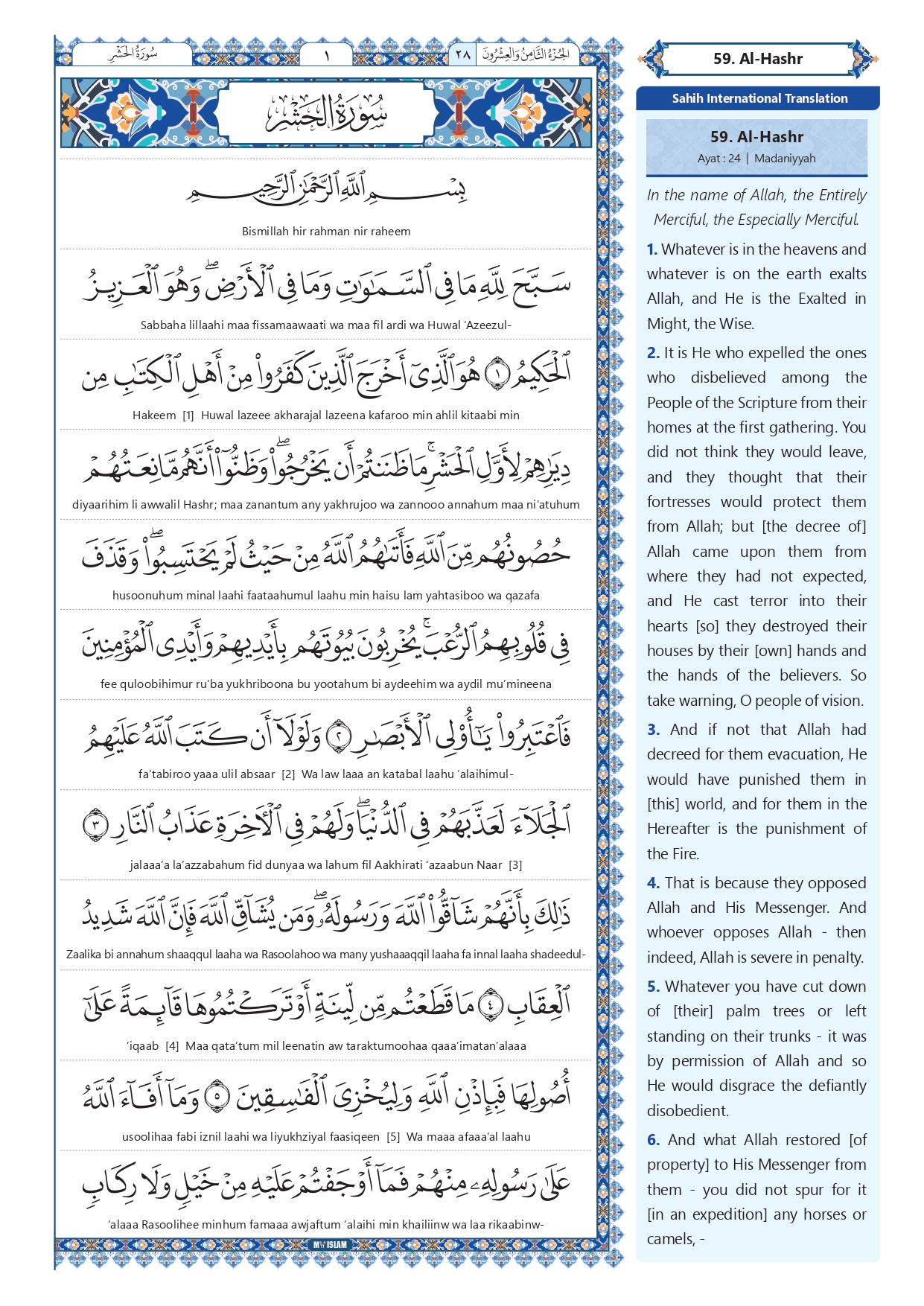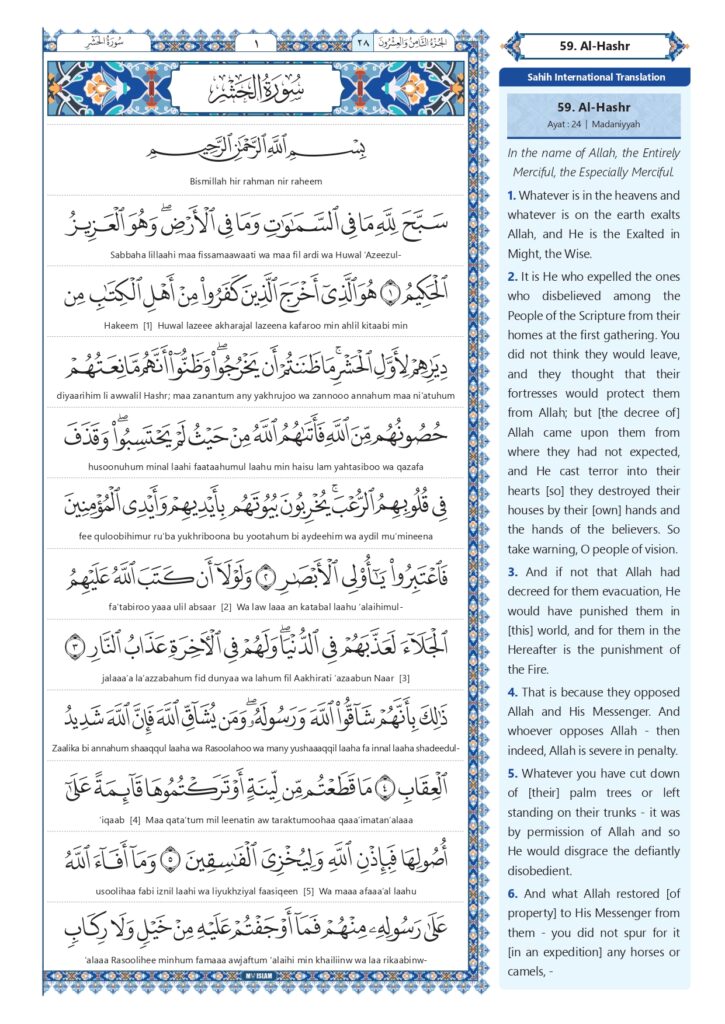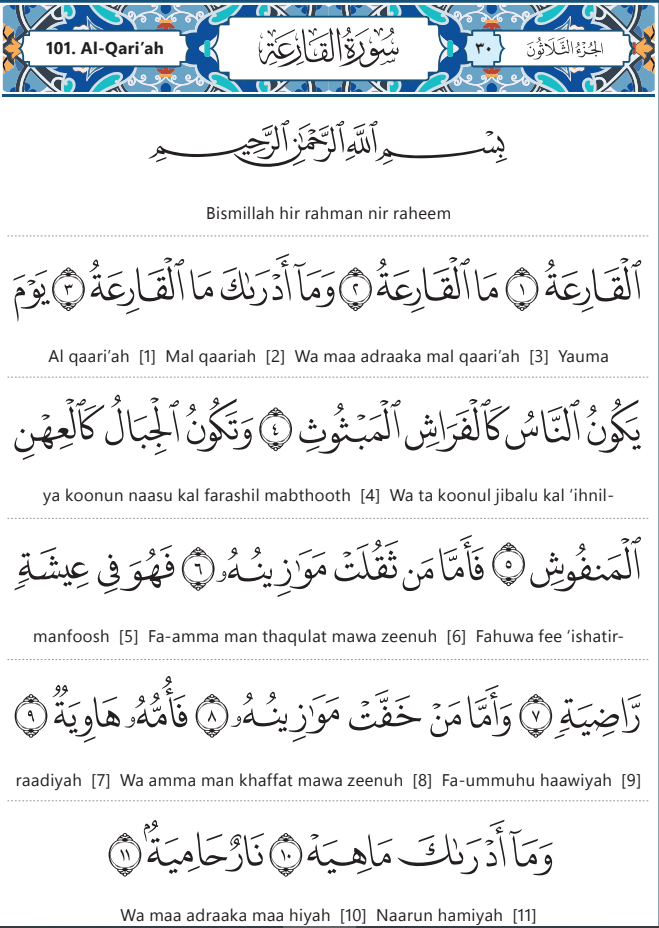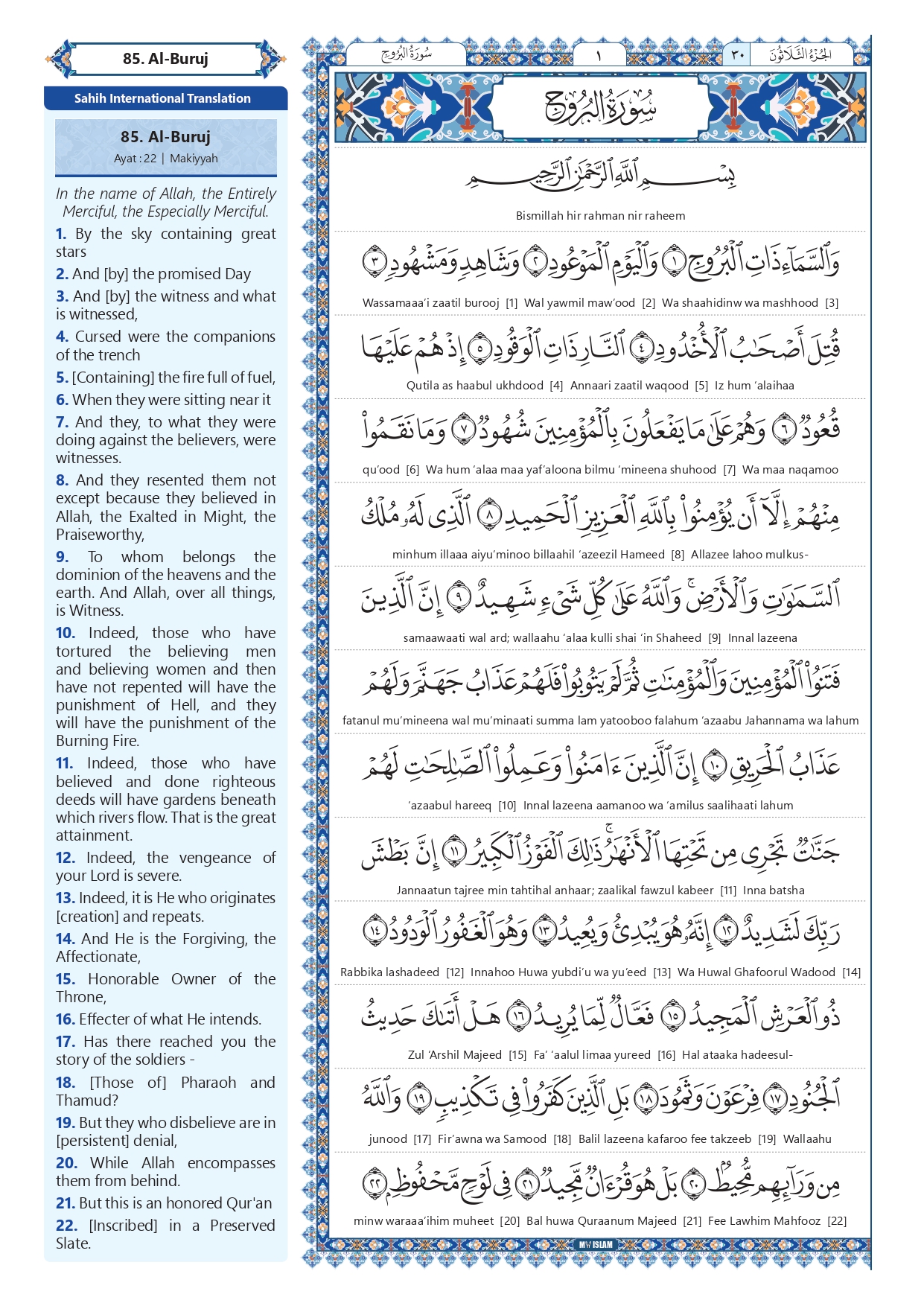Surah Hashr in Engilsh Transliteration, also known as “The Gathering,” is the 59th chapter of the Holy Qur’an. This powerful and thought-provoking Surah consists of 24 verses, revealed in Medina, and it addresses themes of divine guidance, the fate of the disobedient, and the glory and majesty of Allah.
What is surah hashr in Engilsh Transliteration?
Surah Al-Hashr highlights the incident of the exile of the Jewish tribe Banu Nadir from Medina and emphasizes lessons of faith, unity, and reliance on Allah. The Surah also presents one of the most beautiful and awe-inspiring descriptions of Allah’s names and attributes. It encourages believers to reflect on the wisdom and might of Allah and to remain steadfast in their faith.
Surah Al-Hashr:
Surah Al-Hashr gathers reminders of Allah’s glory and names.
Read its final verses to fill your heart with peace.

Come back anytime to Arabic-OM.com to stay close to the remembrance.
Full English Transliteration of Surah Al-Hashr



surah hashr in Engilsh Transliteration
A’uthu billahi min ash-shaytan ir-rajim
Bismillahir Rahmanir Raheem
- Sabbaha lillaahi maa fissamaawaati wa maa fil-ard; wa huwa al-‘azeezu al-hakeem.
- Huwal-ladhee akhraja alladheena kafaroo min ahlil kitaabi min diyaarihim li-awwali al-hashr; maa dhanantum an yakhrujoo wa dhannoo annahum maan’i’atuhum husoonuhum mina Allaahi fa ataahumu Allaahu min haythu lam yahtasiboo wa qadhafa fee quloobihim ar-ru’ba yukhriboona buyootahum bi-aydeehim wa aydee al-mu’mineen; fa’tabiroo yaa ulil-absaar.
- Wa law la an kataba Allaahu ‘alayhim al-jalaa’a la’adhdhabahum fid-dunyaa wa lahum fil-aakhirati ‘adhaabu an-naar.
- Dhaalika bi annahum shaaqoo Allaaha wa rasoolahu; wa man yushaaqi Allaaha fa inna Allaaha shadeedu al-‘iqaab.
- Maa qata’tum min leenatin aw taraktumoohaa qaa’imatan ‘alaa usoolihaa fa bi-idhnillahi wa li yukhziyal faasiqeen.
- Wa maa afa’a Allaahu ‘alaa rasoolihi minhum famaa awjaftum ‘alayhi min khaylin wa laa rikabin wa laakinna Allaaha yusallitu rusulahu ‘alaa man yashaa’; wa Allaahu ‘alaa kulli shay’in qadeer.
- Maa afa’a Allaahu ‘alaa rasoolihi min ahlil-quraa falillahi wa lirrasooli wa lidheel-qurbaa wal-yataamaa wal-masaakeeni wabni as-sabeeli kay laa yakoona doolatam bayna al-aghniyaa’i minkum; wa maa aataakumu ar-rasoolu fakhuthoohu wa maa nahaakum ‘anhu fantahoo; wattaqoo Allaaha inna Allaaha shadeedu al-‘iqaab.
- Lilfuqaraaa’il muhajireena al-ladheena ukhriijoo min diyaarihim wa amwaalihim yabtaghoona fadlan min Allaahi wa ridwaanan wa yansuroona Allaaha wa rasoolahu; ulaa’ika hum as-saadiqoon.
- Wal-ladheena tabawwaa’ud-daar wal-eemaan min qablihim yuhibboona man haajara ilayhim wa laa yajidoona fee sudoorihim haajatan mimmaaa ootoo wa yu’thiroona ‘alaa anfusihim wa law kaana bihim khasaasah; wa man yooqa shuhha nafsihi fa ulaa’ika humul-muflihoon.
- Wal-ladheena jaa’oo min ba’dihim yaqooloona rabbanaa aghfir lanaa wa li ikhwaaninalladheena sabaqoona bil-eemaani wa laa taj’al fee quloobinaa ghillan lil-ladheena aamanoo; rabbanaa innaka ra’oofun raheem.
- Alam tara ilal-ladheena naafaqoo yaqooloona li ikhwaanihim alladheena kafaroo min ahlil kitaabi la’in ukhrijtum lanakhrujanna ma’akum wa laa nutee’u feekum ahadan abadan wa in qootiltum lanansurannakum; wa Allaahu yashhadu innahum lakaathiboon.
- La’in ukhrijoo laa yakhrujoona ma’ahum wa la’in qootiloo laa yansuroonahum wa la’in nasaroohum la-yuwallunnal-adbaara thumma laa yunsaroon.
- La’antum ashaddu rahbatan fee sudoorihim mina Allaah; dhaalika bi annahum qawmul laa yafqahoon.
- Laa yuqaatiloonakum jamee’an illa fee quraan muhassanatin aw min waraaa’i judur; ba’suhum baynahum shadeed; tahsabuhum jamee’an wa quloobuhum shattaa; dhaalika bi annahum qawmul laa ya’qiloon.
- Kamathali al-ladheena min qablihim qareeban thaaqoo wabala amrihim wa lahum ‘adhaabun aleem.
- Kamathali ash-shaytaani ith qaala lil-insaani ukfur; falammaa kafara qaala innee baree’um mink innee akhaafu Allaaha rabbal-‘aalameen.
- Fakaan ‘aaqibatuhumaa annahumaa fin-naari khaalidayni feehaa; wa dhaalika jazaa’uz-zaalimeen.
- Yaa ayyuhal-ladheena aamanoo ittaqoo Allaaha wal-tanthur nafsum ma qaddamat lighad; wattaqoo Allaaha inna Allaaha khabeerum bimaa ta’maloon.
- Wa laa takoonoo kalladheena nasoo Allaaha fa ansaahum anfusahum; ulaa’ika humul faasiqoon.
- Laa yastawaa as-haabu an-naar wa as-haabu al-jannah; as-haabu al-jannati humul faa’izoon.
- Law anzalnaa haadhaa al-qur’aana ‘alaa jabalin lara’aytahoo khaashi’an mutasaddi’an min khashyati Allaah; wa tilka al-amthaalu nadribuhaa linnaasi la’allahum yatafakkaroon.
- Huwallaahu allathee laa ilaaha illa huwa ‘aalimu al-ghaybi wash-shahaadah; huwa ar-rahmaan ur-raheem.
- Huwallaahu allathee laa ilaaha illa huwa al-malikul quddoosu as-salaamu al-mu’minu al-muhayminu al-‘azeezu al-jabbaaru al-mutakabbir; subhaana Allaahi ‘ammaa yushrikoon.
- Huwallaahu al-khaaliqul baari’u al-musawwiru lahu al-asmaa’u al-husna; yusabbihu lahu maa fissamaawaati wal-ard; wa huwa al-‘azeezu al-hakeem.
English Translation:
- Whatever is in the heavens and whatever is on the earth exalts Allah, and He is the Exalted in Might, the Wise.
- It is He who expelled the ones who disbelieved among the People of the Scripture from their homes at the first gathering. You did not think they would leave, and they thought that their fortresses would protect them from Allah; but [the decree of] Allah came upon them from where they had not expected, and He cast terror into their hearts [so] they destroyed their houses by their [own] hands and the hands of the believers. So take warning, O people of vision.
- And if Allah had not decreed for them evacuation, He would have punished them in this world, and for them in the Hereafter is the punishment of the Fire.
- That is because they opposed Allah and His Messenger. And whoever opposes Allah – then indeed, Allah is severe in penalty.
- Whatever you have cut down of [their] palm trees or left standing on their trunks – it was by permission of Allah and so He would disgrace the defiantly disobedient.
- And what Allah restored of property to His Messenger from them – you did not spur for it any horses or camels, but Allah gives His messengers power over whom He wills, and Allah is over all things competent.
- And what Allah restored to His Messenger from the people of the towns – it is for Allah and for the Messenger and for [his] near relatives and orphans and the needy and the [stranded] traveler – so that it will not be a perpetual distribution among the rich from among you. And whatever the Messenger has given you – take; and what he has forbidden you – refrain from. And fear Allah; indeed, Allah is severe in penalty.
- For the poor emigrants who were expelled from their homes and their properties, seeking bounty from Allah and His approval and supporting Allah and His Messenger, [there is also a share]. Those are the truthful.
- And [also for] those who were settled in the Home [i.e., al-Madinah] and [adopted] the faith before them. They love those who emigrated to them and find not any want in their breasts of what the emigrants were given but give [them] preference over themselves, even though they are in privation. And whoever is protected from the stinginess of his soul – it is those who will be the successful.
- And [there is a share for] those who came after them, saying, “Our Lord, forgive us and our brothers who preceded us in faith and put not in our hearts [any] resentment toward those who have believed. Our Lord, indeed You are Kind and Merciful.”
- Have you not considered those who practice hypocrisy,
The Importance and Benefits of surah hashr in Engilsh Transliteration
- Remembrance of Allah’s Attributes: The last three verses of Surah Al-Hashr are particularly powerful, containing many of Allah’s names and attributes. Reciting these verses regularly brings immense spiritual benefits.
- Forgiveness and Protection: It is said that those who recite the last three verses in the morning and evening will receive Allah’s protection.
- A Lesson in Unity and Reliance: The Surah teaches the importance of solidarity among Muslims and complete reliance on Allah during trials.
How to Memorize surah hashr in Engilsh Transliteration
Memorization Tips:
- Divide into Sections: Break down the Surah into smaller parts and memorize each section thoroughly before moving to the next.
- Daily Recitation: Practice regularly to retain the verses in your memory.
- Engage with the Meaning: Understanding the context of the verses aids in memorization and spiritual reflection.
The last three verses of Surah Al-Hashr are among the most powerful descriptions of Allah’s Names and Majesty. Reciting them after Fajr isn’t just Sunnah it’s a shield, a source of light, and a path to divine closeness. Make them part of your dawn worship and feel their impact throughout your day. Start now with the full list of Surahs to recite after Fajr.
How to Recite surah hashr in Engilsh Transliteration
Recitation Guidance:
- Follow Tajweed Rules: Proper pronunciation and articulation are essential when reciting the Qur’an.
- Use Audio Resources: Listening to experienced Qaris can help in perfecting your recitation.
- Watch Our Video: We will provide a detailed video tutorial on how to recite Surah Al-Hashr correctly.
surah al mumtahanah in english Transliteration Read Surah al mumtahanah online 62
surah hashr in Engilsh Transliteration Word by Word
For those seeking to learn the Qur’an with precision, understanding each word is crucial. We offer word-by-word breakdowns, so you can grasp the meaning and pronunciation of every verse.
Learn the Qur’an with Us for Free
Our platform provides a comprehensive and accessible approach to learning the Qur’an. From transliterations and translations to video tutorials and recitation guides, we make learning the Qur’an easy and enjoyable for everyone. Join us and explore the beauty of Allah’s words at no cost.
Frequently Asked Questions (FAQ) surah hashr in Engilsh Transliteration
- What is the main theme of surah hashr in Engilsh Transliteration?
The Surah addresses the expulsion of Banu Nadir and highlights Allah’s power and the importance of reflecting on His attributes. - How many verses are in surah hashr in Engilsh Transliteration?
There are 24 verses in this Surah. - What are the benefits of reciting surah hashr in Engilsh Transliteration?
Reciting the last three verses is highly recommended for protection and forgiveness. - Why is it called “The Gathering”?
The name refers to the gathering of forces that led to the exile of the Banu Nadir tribe. - How can I memorize surah hashr in Engilsh Transliteration effectively?
By dividing it into sections, understanding its meaning, and practicing daily, you can memorize the Surah efficiently. - When should I recite surah hashr in Engilsh Transliteration?
It is beneficial to recite the last three verses in the morning and evening. - What is the significance of the last three verses?
These verses contain many of Allah’s names and attributes and offer immense spiritual protection. - How does Surah Al-Hashr inspire reflection on Allah’s power?
The Surah emphasizes the consequences of disobedience and the majesty of Allah’s attributes. - Can I learn Surah Al-Hashr even if I am a non-Arabic speaker?
Yes, our transliteration and video guides make it easy for non-Arabic speakers to learn and recite. - Where can I find resources to learn surah hashr in Engilsh Transliteration?
You can access our free resources, including transliterations, translations, and recitation videos, on our platform.




Pingback: Surahs to Read After Fajr: Spiritual Uplift and Morning Blessings - The Best -